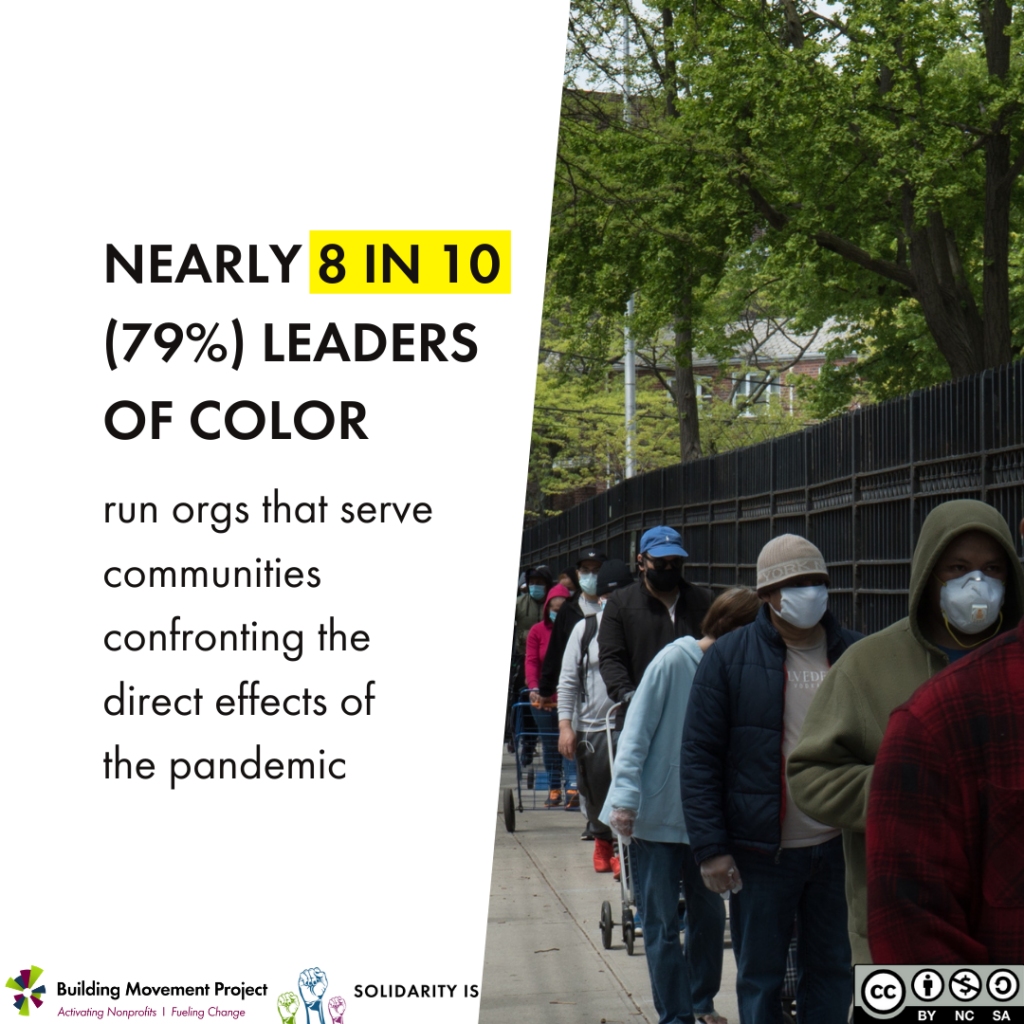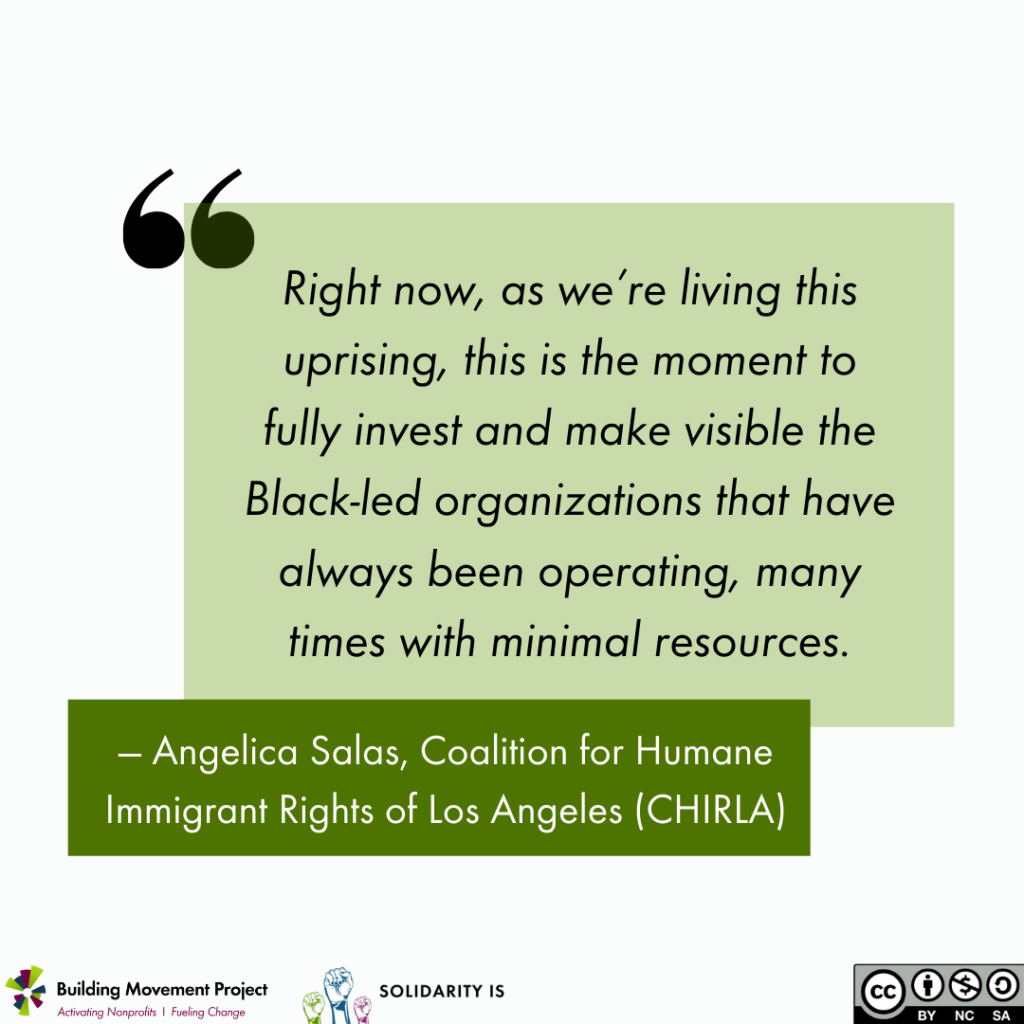Oct
27
2020
Last week, the Building Movement Project hosted a webinar on the release of our newest report On the Frontlines: Nonprofits Led by People of Color Confront COVID-19 and Structural Racism. We presented the data, key findings, and recommendations for the nonprofit sector, philanthropy, and for systemic and policy changes. We also heard from three nonprofit leaders of color who were interviewed as part of the research for the new report: Angela Lang (Black Leaders Organizing for Communities), Janeen Comenote (National Urban Indian Family Coalition), and Kavita Mehra (Sakhi for South Asian Women).
Quick Access: Report, Recording, Presentation Slides, Transcript
We asked the panelists to share their reactions to the data as well as their experiences leading during times of crisis and possibility. The key findings of the report are below, as well as some of the main takeaways from the panel discussion.
Five Key Findings
1 | The crisis is about to get worse
2 | Nonprofits are making up for government inefficiencies
3 | The current climate is taking an immense toll on POC leaders, particularly women of color
4 | The long-term financial stability of POC-led nonprofits is unclear
5 | It’s time for systemic change and solidarity

Meeting Staff and Community Needs
The panelists shared how their organizations are responding to the current moment and preparing for the anticipated needs of their staff and the communities in the months ahead. Kavita shared that Sakhi immediately identified the material needs of staff as they shifted to remote work and confronted the impacts of the pandemic. Staff members were equipped with cell phones, Wi-Fi hotspots, and laptops to ensure that could continue working remotely. Sakhi also shifted to a four-day workweek, an unlimited PTO policy, and provided mental health care services to help process trauma. Angela echoed the need for trauma-informed and mental healthcare services. She noted that BLOC has also moved to a four-day workweek to ensure that staff would take time to care for themselves. She cautioned that the practice of “pushing through our trauma for the sake of capitalism” is unsustainable, particularly in moments of crisis, fatigue, and chaos. Janeen continued the conversation around trauma, noting that the devastation in Native communities caused by the pandemic is both deeply traumatic and familiar. “This isn’t the first time we’ve seen a pandemic,” she reminded us, “This is genetic memory, this is historical trauma for American Indian communities.”
Effects on Leaders of Color
When asked how they are coping with the effects of the pandemic, the uprisings against anti-Black racism, and the economic downturn, the three panelists shared very similar concerns. First, Angela identified that everything happening to staff and to community members is also happening to organizational leaders. The stress, exhaustion, and emotional toll of leading in this moment is immense, particularly for leaders of color and even more so for women of color leaders and Black leaders.

Angela continued that there is an expectation for leaders to lead while processing “the same trauma and grief that everyone else gets the opportunity to heal, grieve, and process. We’re expected to not miss a beat.” Janeen added that there is the additional concern about the long-term financial sustainability of POC-led nonprofits in the sector. She explained, “It’s not just thinking about the pandemic and looming joblessness and homelessness and actual illness and hospitalizations. It’s also what are we going to do in five years? How am I going to provide for my community and my employees in five years?” Kavita concluded that the pressure particularly on women leaders of color to be everything for everyone is exhausting.
Impact of the 2020 Uprisings
Angela began this discussion by identifying the difficulty in assessing the long-term impact of the current moment on our communities. She noted that team members are also community members and family members with connections and relationships that are far reaching. In places that have become sites of social and political unrest, like Kenosha, which is only a few miles from where her organization is based, there are people who have been tremendously impacted. She highlighted the growing divisiveness and tendency towards violence in the United States, as well as the fear that many folks now carry with them. Janeen echoed that this has been an intense couple of months, but that it has always been intense for people of color. In looking towards the future, she shared a story once told to her by an elder that asked, who will take away the guns and who will treat the wounded? Janeen also stressed the importance of seeing the connections between movements, centering Black lives, and using this moment as an opportunity to work together in solidarity. Kavita affirmed the need to center the leadership of Black-led groups and investing in Black communities. She also highlighted that folks must take responsibility in this moment to turn inward and confront their own anti-Black racism.
Calls to Action for Philanthropy
- Support Black-led organizations
- Increase flexibility around reporting
- Offer multi-year general operating funding
- Invest in and sustain movements for the long haul
- Take the time to research and connect with grantees
You can explore more of the data, findings, and recommendations here. You can also watch the webinar recording below (or on YouTube), read the webinar transcript, and download the presentation slides.

